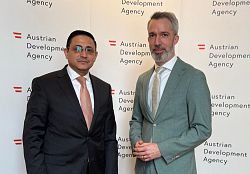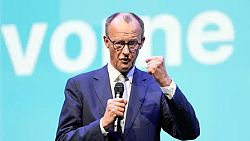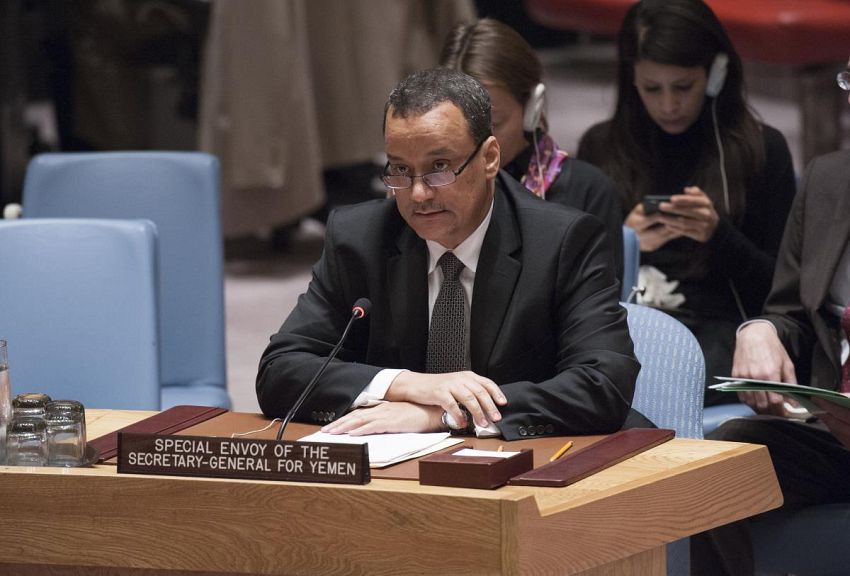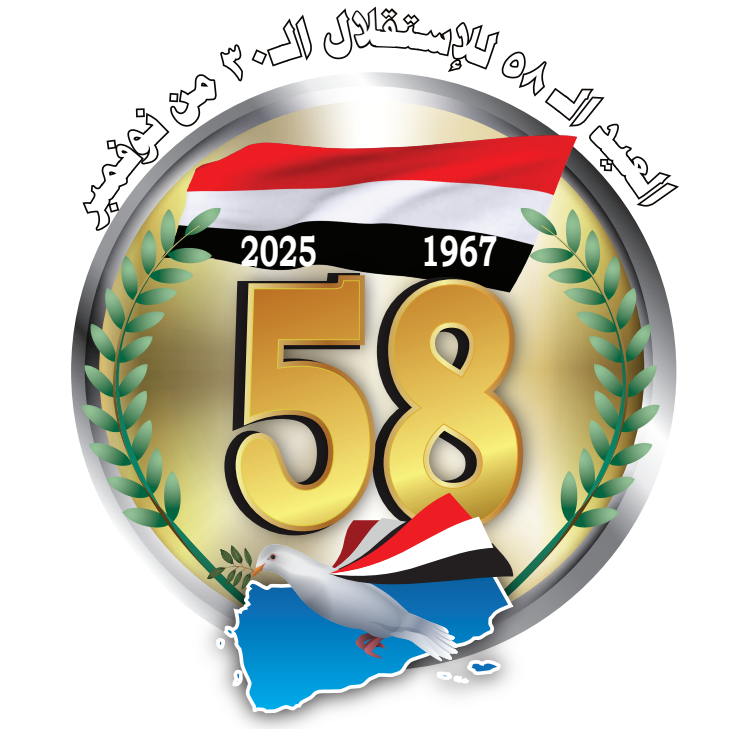
Yemen’s Ambassador Discusses Strengthening Development Cooperation with Austrian Development Agency
Yemen’s Ambassador to Austria, Haytham Shoja'adin, met on Friday with the Director of the Austrian Development Agency, Bernd Brunner, to discuss ways to enhance and advance development cooperation between the two friendly countries.

German Chancellor Says Europe Must Stand Strong
German Chancellor Friedrich Merz has called on Europeans to strive for greater autonomy, emphasizing the need for Europe to defend itself using its own capabilities, given the shift in transatlantic relations.

Korea large companies' exports rise 10 percent
Large companies' exports in South Korea rose approximately 10 percent year-on-year in the fourth quarter of last year, driven by increased global demand for semiconductors.

Saudi League: Al-Nassr, Al-Ettifaq and Neom Secure Victories Over Al-Ittihad, Damac and Al-Riyadh
Al-Nassr defeated its guest Al-Ittihad 2–0 in the match that brought them together at Al-Awwal Park Stadium in Riyadh, as part of the 21st round of the Saudi Professional League.
Last Update: ،
2026/02/21
Time
02:35:08
Latest News:
 Yemeni Leadership Condemns Attempts to Disrupt State Institutions and Vows to Maintain Order
Yemeni Leadership Condemns Attempts to Disrupt State Institutions and Vows to Maintain Order
 Stability of Aden cornerstone for eliminating the coup—Lieutenant General al-Subaihi stressed
Stability of Aden cornerstone for eliminating the coup—Lieutenant General al-Subaihi stressed
 Government Holds its First Meeting
Government Holds its First Meeting
 Yemeni Ambassador Explores Ways to Boost Cultural Cooperation with Indonesian Minister
Yemeni Ambassador Explores Ways to Boost Cultural Cooperation with Indonesian Minister
 Yemeni Ambassador Discusses Boosting Judicial Cooperation with Moroccan Prosecutor General
Yemeni Ambassador Discusses Boosting Judicial Cooperation with Moroccan Prosecutor General
Latest News:
 Yemeni Leadership Condemns Attempts to Disrupt State Institutions and Vows to Maintain Order
Yemeni Leadership Condemns Attempts to Disrupt State Institutions and Vows to Maintain Order
 Stability of Aden cornerstone for eliminating the coup—Lieutenant General al-Subaihi stressed
Stability of Aden cornerstone for eliminating the coup—Lieutenant General al-Subaihi stressed
 Government Holds its First Meeting
Government Holds its First Meeting
 Yemeni Ambassador Explores Ways to Boost Cultural Cooperation with Indonesian Minister
Yemeni Ambassador Explores Ways to Boost Cultural Cooperation with Indonesian Minister
 Yemeni Ambassador Discusses Boosting Judicial Cooperation with Moroccan Prosecutor General
Yemeni Ambassador Discusses Boosting Judicial Cooperation with Moroccan Prosecutor General
UN outgoing envoy for Yemen makes last briefing to UN Security Council
[27/02/2018 05:08]
WASHINGTON-SABA
The outgoing special envoy of the UN Secretary General for Yemen Ismail Ould Chiekh Ahmed has briefed the UN Security Council before the end of his assignment.
Here is what he had to say:
"This is my last briefing to this Council before the end of my assignment as Special Envoy of the Secretary-General for Yemen.
I began my assignment in April 2015, with Yemen already embroiled in a conflict that has gradually destroyed the economy, healthcare services, housing, roads and schools – everything that Yemenis need in order to live and prosper.
The parties have continued the destructive pattern of zero-sum politics which has led the country to plunge into more poverty and destruction. Decision-makers in this conflict perceive concessions as weakness and dissent as a threat.
Regrettably, they have consistently taken irresponsible, and provocative actions, disregarding the daily suffering of Yemenis generated by this conflict.
The last two months witnessed a renewed and large-scale escalation of military confrontations in Al-Hodeidah, Al-Jawf, Sana’a and Al-Baida as well as areas along the Yemeni-Saudi border. The Houthis continue to fire ballistic missiles into the Kingdom of Saudi Arabia.
Fighting in Ta’iz governorate has been particularly bloody and destructive, and while Aden and the neighboring governorates have been the scene of continuous clashes. During the latest outbreak of violence in the city on 28 January, dozens of people were killed and hundreds more were injured. I reiterate my call to all stakeholders in Aden to demonstrate self-restraint and avoid any inflammatory speech. I urge them to resolve their differences in a peaceful and constructive manner through dialogue.
I am also seriously concerned by reports from several humanitarian organizations on the recruitment of thousands of child soldiers by all parties to the conflict, which constitutes a flagrant violation of children’s rights. While the reports indicate that all warring parties have engaged in such practices, the systematic recruitment of children by the Houthis may have negative implications on the future of the country.
Parties must adhere to international law and international humanitarian law. Any intentional or direct attack against civilians or civilian objects is a serious violation of international humanitarian law. The parties must respect the principles of distinction, proportionality and precaution, and ensure access of affected populations to humanitarian assistance.
Mr. President,
As the conflict has deepened, the economic and humanitarian crisis has deepened with it, making Yemen the world’s largest man-made humanitarian crisis. Since 2015, Yemen’s economy has shrunk by almost forty per cent. In 2017, the value of the Yemeni riyal dropped by more than fifty per cent. The decline of the currency and the related sharp increase in prices, had a negatively affected the economy, and therefore hampered the delivery of basic supplies. These factors had a direct affect the private sector as well as the payment of salaries of the public sector Undoubtedly, the non-payment of salaries for more than a year constitutes a massive burden on the Yemeni citizens. Indeed, it has become clear that revenues that should be contributing to salary payments, maintaining basic services and stimulating the economy are instead being used to fund the war. Moreover, informal taxation and other forms of corruption are flourishing, exacerbating the humanitarian situation.
These factors mean that Yemeni households are losing their purchase power and access to basic services. 22.2 million Yemenis are now in need of some form of humanitarian assistance, compared to 15.9 million in March 2015.
In the context of these appalling and vast humanitarian challenges, I welcome the generous pledge of 1 billion US dollars by the Kingdom of Saudi Arabia and the United Arab Emirates to support humanitarian action and reconstruction in Yemen, as well as their commitment to raise an additional 500 million US dollars from other donors in the region. I hope that these initiatives will materialize, and that the funds pledged will be disbursed soonest to improve the current precarious situation.
Mr. President,
Yemeni women has suffered some of the worst effects of the conflict. The space for women’s rights is shrinking every day. I heard many Yemeni women saying that they “live in a big prison” where their freedom of speech is restricted. Those who do speak up face a constant threat of persecution and violent attempts to silence them. However, despite these daily challenges, Yemeni women are remarkably resilient and their inclusion in the peace process is critical.
Mr. President,
I would like to express my gratitude to the World Bank for its innovative approach in Yemen, which is unique in a country with conflict. The partnership between my office and the World Bank, in collaboration with the UN Country Team, has contributed not only to the alleviation of suffering of some of the most vulnerable families, but also to the preservation of Yemen’s institutions in the long term.
I would also like to express my appreciation to the group of eighteen ambassadors with accreditation to Yemen and the states that have hosted talks with the parties, including Switzerland, Kuwait and Oman. During the past few weeks, I have visited several countries in the region, as well as the Gulf Cooperation Council Secretariat. They are fully aware of the importance of a peaceful solution to this conflict to stabilize the region and fight terrorism.
Mr. President,
Over the past three years, and throughout my continuous meetings with the parties, I believe a solid foundation for an agreement has been laid through the endorsement of the general framework in Biel in 2015 and the discussions that took place in Kuwait in 2016.
Those who follow the Yemen file closely will acknowledge that the United Nations has spared no effort to help the Yemeni parties reach a peaceful solution. During the course of my interactions with the parties, we have discussed the details of a peace roadmap with a clear timeline, taking into account the parties needs and challenges. Today, I would like to announce, for the first time, that we were about to reach agreement on a peace proposal, developed in consultation with the parties, but they refused to sign in the last minute. In the end of the consultations, it became clear that the Houthis were not prepared to make concessions on the proposed security arrangements. This has been a major stumbling block towards reaching a negotiated solution.
We see daily reports about civilians dying of poverty, hunger or illness but we should not forget that many politicians from all sides are profiting from this conflict, from trading of arms and exploiting public properties for personal purposes.
In their speeches, these politicians will stir up strife to deepen the rift in the Yemeni society and at other times, they declare pro-peace positions, while in private circles, they look indifferent to the suffering of their people. Whoever wants peace creates solutions, not excuses.
We do have a peace roadmap for Yemen. The practical suggestions to launch it and build confidence among the parties have been agreed upon. The only part missing is the commitment of parties to make concessions and give priority to the national interest. This is what makes us doubtful of their real intention to end this war. I wish the new Envoy Mr. Martin Griffiths, every success in his efforts, which I have no doubt will benefit from his wide-ranging experience in diplomacy. I hope that this roadmap will constitute a cornerstone to move forward and activate the peace process.
To conclude, a promise, thanks and a call
A promise to the Yemeni people to follow up on the file with the concerned and share my experience and knowledge of the Yemeni issue in any possible way to contribute to peace. I was in Yemen before becoming a Special Envoy and I have experienced the courage and manners of the people of Yemen. I will follow the progress of the file until Yemen returns to Yemen, even after the end of my assignment.
My thanks go to the members of this council and the international community for their support to the UN-led mediation efforts during the past three years, including the efforts of the Gulf Cooperation Council.
The call is to the Yemeni Parties that are solely responsible for all that is happening. I call on them to turn the page of this appalling war in the history of Yemen. The United Nations is facilitating the path for peace and the international community is creating a favorable environment for it. Only the Yemeni decision-makers are able to stop the war and the bloodshed, and I repeat only the Yemeni decision-makers are able to stop the war and the bloodshed.
The regional landscape is encumbered with challenges, political and sectarian disputes and economic pressures. There is no doubt that the developments in recent months in Yemen will reshuffle the political cards and change some internal blocs, especially considering the pressure and challenges encountered by the General People's Conference in addition to the emergence of southern popular voices expressing their demands.
I call on the parties to cease hostilities, reactivate negotiations aimed at a peaceful settlement. I urge them to make the culture of coexistence prevail over the language of war, so that Yemen becomes a beacon of light in the Middle East and a model for peace and security where men and women, young men and women from the east and west, from the north and south participate in decision-making."
Key words:
proportionality - confrontations - reconstruction - international - organizations - irresponsible - consultations - accreditation - collaboration - Regrettably - Yemeni Leadership Condemns Attempts to Disrupt State Institutions and Vows to Maintain Order
Yemeni Leadership Condemns Attempts to Disrupt State Institutions and Vows to Maintain Order Government Holds its First Meeting
Government Holds its First Meeting  Yemeni Ambassador Explores Ways to Boost Cultural Cooperation with Indonesian Minister
Yemeni Ambassador Explores Ways to Boost Cultural Cooperation with Indonesian Minister President al-Alimi: Restoring Sana’a and a Just, United Yemen Will Remain a Unifying National Goal
President al-Alimi: Restoring Sana’a and a Just, United Yemen Will Remain a Unifying National Goal Yemen’s Ambassador Participates in Board Meeting of Arab World Institute in Paris
Yemen’s Ambassador Participates in Board Meeting of Arab World Institute in Paris Chairman of the Presidential Leadership Council Exchanges Ramadan Greetings with Arab and Islamic Leaders
Chairman of the Presidential Leadership Council Exchanges Ramadan Greetings with Arab and Islamic Leaders Ministry of Endowments Announces Wednesday as First Day of Ramadan
Ministry of Endowments Announces Wednesday as First Day of Ramadan Public Works Minister, UNOPS Review Cooperation on Road Maintenance Projects
Public Works Minister, UNOPS Review Cooperation on Road Maintenance Projects Al-Arada calls on international community to support Yemeni government, people
Al-Arada calls on international community to support Yemeni government, people Rights Monitor Documents 868 Serious Violations by Houthi Militias in Al-Bayda in 2025
Rights Monitor Documents 868 Serious Violations by Houthi Militias in Al-Bayda in 2025


